Book contents
- Frontmatter
- Contents
- Foreword
- Acknowledgements
- Introduction
- Chapter One ‘Off-Stage, A War’: Wuhan, 1938
- Chapter Two Frederic Lees in Varese Ligure, 1911
- Chapter Three ‘A Rude People Subjected to No Restraint’: In Tanimbar with Anna Keith Forbes, Henry Forbes and So’u Melatunan
- Chapter Four Sent to Coventry: A Journey Home?
- Chapter Five Bedouin Is a Place: Freya Stark’s Travel with Nomads
- Chapter Six With Wilkie in the West: Reading Wilkie Collins’s Rambles beyond Railways from a Cornish Perspective
- Chapter Seven Picturing Rome: Walking the Eternal City with the Last Victorian
- Chapter Eight Su e zo per i ponti; or, How History Does Not Help
- Chapter Nine A Town Called Entropy: Boom and Bust in Arnold Bennett’s Potteries
- Chapter Ten Travelling towards Transculturalism? Statues, Remembrance and Mourning in Bloemfontein, South Africa
- Chapter Eleven Recollections of the King’s House
- Chapter Twelve Occupying Her Time: Ginette Eboué, France, 1940–42
- Epilogue
- List of Contributors
- Works Cited
Chapter One - ‘Off-Stage, A War’: Wuhan, 1938
Published online by Cambridge University Press: 18 November 2021
- Frontmatter
- Contents
- Foreword
- Acknowledgements
- Introduction
- Chapter One ‘Off-Stage, A War’: Wuhan, 1938
- Chapter Two Frederic Lees in Varese Ligure, 1911
- Chapter Three ‘A Rude People Subjected to No Restraint’: In Tanimbar with Anna Keith Forbes, Henry Forbes and So’u Melatunan
- Chapter Four Sent to Coventry: A Journey Home?
- Chapter Five Bedouin Is a Place: Freya Stark’s Travel with Nomads
- Chapter Six With Wilkie in the West: Reading Wilkie Collins’s Rambles beyond Railways from a Cornish Perspective
- Chapter Seven Picturing Rome: Walking the Eternal City with the Last Victorian
- Chapter Eight Su e zo per i ponti; or, How History Does Not Help
- Chapter Nine A Town Called Entropy: Boom and Bust in Arnold Bennett’s Potteries
- Chapter Ten Travelling towards Transculturalism? Statues, Remembrance and Mourning in Bloemfontein, South Africa
- Chapter Eleven Recollections of the King’s House
- Chapter Twelve Occupying Her Time: Ginette Eboué, France, 1940–42
- Epilogue
- List of Contributors
- Works Cited
Summary
War alters the character and life of a city as effectively as the silting of a harbour or a profound climactic change. A year ago […] Hankow was hardly more than a name on the map, somewhere halfway up the Yangtze. Six months later it has become, like Barcelona, one of the most interesting cities in the world.
Two rivers meet at Wuhan. The city sprawls around the junction where the tributary Han joins the Yangtze, before that great river's breadth bends itself around the top half of a circle to push eastward to Shanghai and the coast. On the north-western bank of the Yangtze sit two of the three old cities which make up the modern city of Wuhan – split themselves by the winding waters of the Han, and taking their names, in part, from it: Hanyang and Hankou. On the opposite bank of the Yangtze is Wuchang: the third, and most politically important, of Wuhan's tri-cities, which donates its first syllable to the city's portmanteau name.
Wuhan's position at the confluence of these two rivers meant that even the British colonial forces, when they arrived in 1858, could not fail to recognise its potential importance as a trading port, despite some initial misgivings. In December of that year, the British paddle steamer HMS Furious anchored off Hankou, as part of the first foreign fleet ever to have ascended the 636 miles of the Yangtze from the coast; those aboard were here to cast an appraising eye over a port to which they had just secured trading rights at the end of what would turn out to be the first phase of the Second Opium War.
On this first occasion when the Western gaze was directed towards Wuhan, those examining the cities were distinctly unimpressed: the site, wrote Laurence Oliphant, private secretary to Lord Elgin, was ‘eminently disappointing. We had heard so much of the congeries of cities that are situated at the junction of the Han and the Yang-tse […] that we had formed grander expectations, and anticipated a nobler reward after all our anxieties and exertions.’
- Type
- Chapter
- Information
- Travel Writing in an Age of Global Quarantine , pp. 11 - 20Publisher: Anthem PressPrint publication year: 2021



